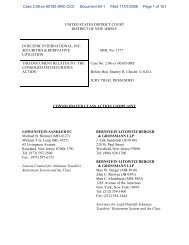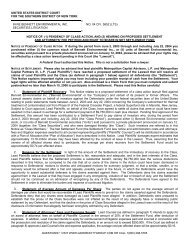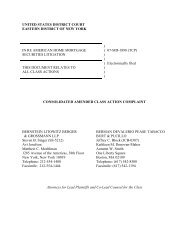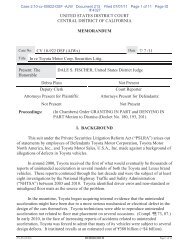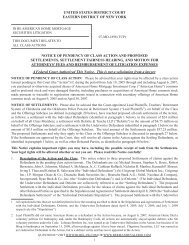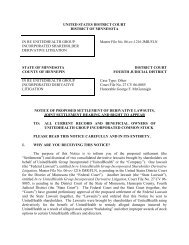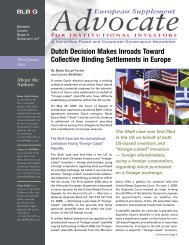to view the Lawdragon's - Bernstein Litowitz Berger & Grossmann LLP
to view the Lawdragon's - Bernstein Litowitz Berger & Grossmann LLP
to view the Lawdragon's - Bernstein Litowitz Berger & Grossmann LLP
You also want an ePaper? Increase the reach of your titles
YUMPU automatically turns print PDFs into web optimized ePapers that Google loves.
“Trials are very important, even <strong>the</strong> bad ones, because<strong>the</strong>y establish <strong>the</strong> facts, and <strong>the</strong> facts are different than<strong>the</strong> judgments and <strong>the</strong> verdicts,” she said. “In 10 years, wemight have more professional institutions, and we mighthave his<strong>to</strong>rians who will take all <strong>the</strong> facts established by <strong>the</strong>trials and start <strong>to</strong> discuss <strong>the</strong>m. Trials deal with facts and<strong>the</strong> testimony of witnesses. This is better than a climatewithout trials.”T i m e h a s a c o m p l i c a t e d r e l a t i o n s h i pwith war crimes trials. On <strong>the</strong> one hand, evidencedisappears, witnesses die and memories fade, all of whichcan thwart or complicate cases. But <strong>the</strong> passage of timecan also reduce <strong>the</strong> influence of obstructive forces, who<strong>the</strong>mselves may die or at least retire – what Petrovic refers<strong>to</strong> as “lustration by biology.” This may make certain casesless politically challenging, and it clearly contributed <strong>to</strong> <strong>the</strong>weakening of fugitive support networks for ICTY indicteeslike Mladic.At <strong>the</strong> same time, Mladic’s arrest and extraditionwas met with protests in Serbia with accusations oftreason against <strong>the</strong> Tadic government. The protests werereportedly less intense than those in reaction <strong>to</strong>Karadzic’s arrest and transfer, but <strong>the</strong>y never<strong>the</strong>lessreveal how difficult it may be <strong>to</strong> prosecute any popular,high-ranking officials domestically. The OSCE polls alsoshowed increases between 2009 and 2011 in <strong>the</strong> numberof respondents who believe that Serbia should notcooperate with <strong>the</strong> ICTY, and in those who do notbelieve <strong>the</strong> domestic cases are contributing <strong>to</strong> reconciliation.The 2011 U.S. State Department human rights reportfor Serbia noted that judges and prosecu<strong>to</strong>rs for warcrimes cases (as well as those for organized crimecases) continue <strong>to</strong> receive death threats, and thatsome personnel require full-time police protection.At this early stage, it is unclear what effect, if any, <strong>the</strong>new Nikolic regime will have on <strong>the</strong> operations of<strong>the</strong> domestic war crimes system. Nikolic’s SerbianProgressive Party supports EU integration, and so it alsosupported Mladic’s arrest and extradition as necessary<strong>to</strong> fulfill Serbia’s obligations. Dissatisfaction withstate corruption and <strong>the</strong> poor economy are <strong>the</strong> mostcommon explanations for his vic<strong>to</strong>ry. The news websiteBalkan Insight recently reported that ICTY chiefprosecu<strong>to</strong>r Brammertz had a positive meeting withPrime Minister Dacic about continued cooperation onwar crimes cases.Yet Jovanovic never<strong>the</strong>less worries that <strong>the</strong> passage oftime could weaken <strong>the</strong> resolve <strong>to</strong> zealously pursue <strong>the</strong> mostcontroversial cases, especially as <strong>the</strong> EU, largely satisfiedwith Serbia’s performance, scales back oversight andpressure. Bringing war crimes cases in Serbia, he said, doesnot come with a political payoff, unlike organized crimescases, which are widely believed <strong>to</strong> threaten <strong>the</strong> state.“It will very much depend on <strong>the</strong> personal ability,persistence, courage and determination of <strong>the</strong> investiga<strong>to</strong>rsand prosecu<strong>to</strong>rs <strong>to</strong> produce some serious results, <strong>to</strong> takesome personal risk and <strong>to</strong> make some unpopular moves,”he said.If anything, <strong>the</strong> experience of Serbia and <strong>the</strong> formerYugoslavia generally suggests that a long-term commitmentfrom both domestic and international institutions willlikely be required develop a credible and constructivewar crimes system in particularly resistant settings.That might be <strong>the</strong> most obvious lesson for justiceadvocates who interpret complementarity as mandatingpost-conflict trials in <strong>the</strong> image of <strong>the</strong> ICC. TheInternational Bar Association’s Ellis, who is working ona book about complementarity, said that <strong>the</strong> lingeringquestion in <strong>the</strong> ICC regime is who exactly will providethis training and assistance, given that <strong>the</strong> court itselfhas said it will not have <strong>the</strong> resources <strong>to</strong> do so.“That is <strong>the</strong> gap in <strong>the</strong> paradigm of <strong>the</strong> RomeStatute,” Ellis said.Serbia’s experience similarly suggests that fairly assessingsocietal outcomes will require a great deal of patience. It isprobably unrealistic <strong>to</strong> have expected public opinion about<strong>the</strong> wars <strong>to</strong> have changed dramatically by now, given <strong>the</strong>powerful his<strong>to</strong>rical forces at play and <strong>the</strong> relative recencyof Milosevic’s rule. Despite limited public engagement with<strong>the</strong> domestic cases, inter<strong>view</strong>s with a range of stakeholderssuggest that <strong>the</strong> cases have made it more common <strong>to</strong> talkabout war crimes in Serbia. Stakeholders also suggest that amore realistic initial goal might be an increased acceptanceamong Serbs of some of <strong>the</strong> basic truths about <strong>the</strong> wars,ra<strong>the</strong>r than a shared understanding about <strong>the</strong> patterns ofatrocities among different ethnic groups.For example, Petrovic sees “a social consensus”developing in Serbia about <strong>the</strong> fact that many crimes werecommitted during <strong>the</strong> wars, and that something should bedone in response.“The term ‘war crimes’ used <strong>to</strong> be oxymoronic here,”Petrovic said. “People used <strong>to</strong> think, ‘If you’re waging war,nothing you do is a crime because it’s war.’ It sounds crazy.But <strong>the</strong> idea that something in war is not lawful is new here.”Vukcevic similarly believes that <strong>the</strong> domestic cases,benefiting from greater legitimacy and a closer connection<strong>to</strong> <strong>the</strong> people, have contributed <strong>to</strong> a growing realizationthat criminal charges against Serbs result from "horriblecrimes" and not from political motivations – <strong>the</strong> mostfrequent criticism of <strong>the</strong> ICTY."Afforded personal insight in<strong>to</strong> <strong>the</strong> case proceedings,people will soon realize that <strong>the</strong> accused are not heroes butinfamous criminals," Vukcevic said. "Once aware of that,people will easily come <strong>to</strong> terms with <strong>the</strong> fact that crimeswere not committed only by people of o<strong>the</strong>r nationalities,but also by <strong>the</strong>ir compatriots – in this particular case,people of Serbian nationality." ■L A W D R A G O N 52 I s s u e 13



